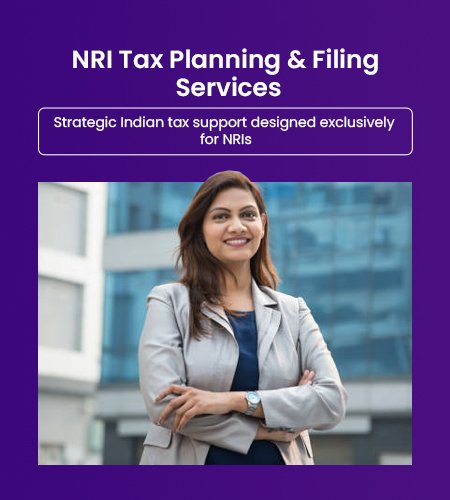
NRI Tax Planning and Filing Services
- • Determine status under FEMA/Income Tax
- • Impacts global vs. Indian income
- • Based on stay duration in India
- • Different rules for seafarers/NOR
- • Key for correct tax filing
- • Income from house property taxable
- • Capital gains on Indian assets
- • Interest from NRO accounts taxable
- • Interest from NRO accounts taxable
- • Dividend income subject to TDS
- • Section 80C for select investments
- • 80D for health insurance premium
- • 80D for health insurance premium
- • Interest on housing loan deductible
- • NRE/NRO interest exemptions available
- • Avoids dual taxation on income
- • Claim relief via Form 10F
- • Lower TDS on DTAA countries
- • Tax credit for foreign taxes
- • 90+ countries have DTAA treaties
NRI Taxation
NRI Tax Planning & Filing Services
Specialized tax solutions for Non-Resident Indians to optimize
tax liability and ensure compliance with Indian tax laws
Residential Status & Taxability for NRIs
Determining the correct residential status is the first and most important step in NRI tax planning. As per the Income Tax Act, 1961, residential status is based on the number of days an individual stays in India during the financial year and preceding years. Only income received or accrued in India is taxable for NRIs. Global income is not taxable in India unless the person qualifies as a resident. Understanding your tax residency status helps ensure correct filing and avoids penalties. NRIs must reassess their status every financial year as it may change based on time spent in India.
Features
Taxable Income for NRIs in India
NRIs are taxed only on income earned or received in India. Common taxable income includes interest on NRO accounts, rent from property in India, capital gains from shares or real estate, and income from business or profession operated in India. TDS is deducted at a higher rate on most NRI incomes. Salary received in India for services rendered in India is also taxable. It's important to use the correct ITR form (usually ITR-2) and report all taxable incomes to avoid future scrutiny or notices from the department.
Features
Tax Benefits & Deductions Available to NRIs
NRIs are eligible for several deductions under Chapter VI-A of the Income Tax Act, 1961. Popular deductions include Section 80C for life insurance premium, ELSS, and principal repayment of home loan, Section 80D for health insurance, and 80G for donations. However, some deductions like 80TTB (interest on savings) are not available to NRIs. Strategic tax planning helps in reducing the effective tax liability. NRIs should also ensure investments are made through eligible instruments to avoid denial of deductions during scrutiny.
Features
DTAA (Double Taxation Avoidance Agreement) & Tax Credit
India has DTAA treaties with over 90 countries to avoid double taxation. NRIs can claim relief under DTAA to prevent being taxed twice on the same income. For example, if an NRI pays tax in the foreign country, they may claim credit or exemption in India for the same income. To avail DTAA benefits, NRIs must provide a Tax Residency Certificate (TRC), Form 10F, and declaration of beneficial ownership. This prevents excess TDS and allows lawful tax minimization while ensuring compliance with both countries' laws.
Features
Tax Implications Based on Residential Status
| Criteria | Resident | RNOR | Non-Resident (NRI) |
|---|---|---|---|
| Global Income Taxable in India | Yes | No (except Indian-source income) | No |
| Income Earned Outside India | Taxable | Not Taxable | Not Taxable |
| Indian Income (e.g., rent, FD) | Taxable | Taxable | Taxable |
| DTAA Benefits Applicable | No | Yes | Yes |
| Form Used for ITR | ITR-1/2/3 (as applicable) | ITR-2/3 | ITR-2 |
| TDS Applicability on Income | Lower (as per slabs) | Higher than resident | Highest rate applicable |
| Deductions (80C, 80D etc.) | Allowed | Allowed (with limits) | Allowed (with conditions) |
| Eligibility for 80TTB | Yes (Senior Citizens) | No | No |
Optimize Your NRI Tax Strategy
Our tax specialists can help you navigate complex NRI taxation rules and maximize your tax benefits.
Get NRI Tax Consultation© ROKADH FINANCIAL SERVICES PRIVATE LIMITED

